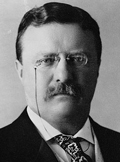 |
Theodore Roosevelt
b. 27 Oct 1858, New York City, New York
d. 6 Jan 1919, Oyster Bay, Nassau County, New York |
| Title: |
President of the United States |
| Term: |
14 Sep 1901 - 4 Mar 1905 |
| Chronology: |
13 Feb 1901,
election to the office of Vice President of the United States is declared upon counting electoral votes (cast 14 Jan 1901),
joint session of the Senate and House of Representatives, House Chamber, U.S. Capitol, Washington, D.C. [1] |
|
4 Mar 1901,
commencement of term |
|
4 Mar 1901,
took the oath prescribed by law, regular session of the Senate, Senate Chamber, U.S. Capitol, Washington, D.C. [2] |
|
14 Sep 1901,
entered upon the duties of the office of President of the United States upon the death of an incumbent |
|
14 Sep 1901,
took an oath of office as President of the United States, private ceremony, Ansley Wilcox residence, Buffalo, New York [3] |
|
4 Mar 1905,
expiration of term |
| Term: |
4 Mar 1905 - 4 Mar 1909 |
| Chronology: |
8 Feb 1905,
election to the office of President of the United States is declared upon counting electoral votes (cast 9 Jan 1905),
joint session of the Senate and House of Representatives, House Chamber, U.S. Capitol, Washington, D.C. [4] |
|
4 Mar 1905,
commencement of term |
|
4 Mar 1905,
took an oath of office as President of the United States, inaugural ceremony as part of the special session of the Senate, East Portico, U.S. Capitol, Washington, D.C. [5] |
|
4 Mar 1909,
expiration of term |
| Biography: |
| Born in the family of a New York philanthropist, merchant, and partner in the glass-importing firm Roosevelt and Son; was privately tutored; graduated from Harvard University in 1880; studied law; traveled abroad; member, New York State Assembly (1882-1884); moved to North Dakota and lived on his ranch; returned to New York City (1886); appointed by President Benjamin Harrison a member of the Civil Service Commission (1889-1895), when he resigned to become president of the New York Board of Police Commissioners; resigned this position upon his appointment by President William McKinley as Assistant Secretary of the Navy (1897-1898); resigned to enter the war with Spain (1898); organized the First Regiment, United States Volunteer Cavalry, popularly known as Roosevelt's Rough Riders; Governor of New York (1899-1900); elected Vice President of the United States (4 Mar 1901 - 14 Sep 1901) on the Republican ticket headed by William McKinley; assumed the presidency upon the death of President McKinley (14 Sep 1901); activated the Sherman Anti-Trust Act of 1890; established the supremacy of the federal government in the industrial field; moved against oil, tobacco, and other monopolies; persuaded Congress to establish a Bureau of Corporations with sweeping power to investigate business practices; intervened in labour relations indirectly defending the position of employees (arbitration of a strike by the United Mine Workers of America against the Pennsylvania anthracite coal operators); course labeled "Square Deal"; used the Big Stick Diplomacy in the acquisition of the Panama Canal Zone from Colombia in 1903; elected President of the United States in 1904; advocated Hepburn Act of 1906, which enlarged federal jurisdiction and forbade railroads to increase rates without approval; awarded the Nobel Peace Prize in 1906 for mediating the Russo-Japanese War of 1904-1905; the unsuccessful candidate of the Progressive Party for President of the United States in 1912 and 1916; engaged in literary pursuits. |
| Biographical sources: Biographical Directory of the United States Congress (2005). |
| Elections: |
| Candidate |
Electoral vote (14 Jan 1901) |
| Theodore Roosevelt |
292 |
| Adlai Ewing Stevenson |
155 |
| total number of electors appointed |
447 |
| number of votes for a majority |
224 |
| Candidate |
Electoral vote (9 Jan 1905) |
| Theodore Roosevelt |
336 |
| Alton Brooks Parker |
140 |
| total number of electors appointed |
476 |
| number of votes for a majority |
239 |
|
| Source of electoral results: Congressional Record, 56th Congress, 2nd Session, 2371-2372; Congressional Record, 58th Congress, 3rd Session, 2062.
|
| |
| [1] |
Congressional Record, 56th Congress, 2nd Session, 2371-2372. |
| [2] |
Congressional Record, 56th Congress, 2nd Session, 3562. |
| [3] |
The New York Times, New York, Sunday, September 15, 1901, vol. L, No. 16,127, p. 1; "How Theodore Roosevelt Became President of the United States in Buffalo, September 14, 1901", by Ansley Wilcox (Matthews-Northrup Works, 1902). |
| [4] |
Congressional Record, 58th Congress, 3rd Session, 2062. |
| [5] |
Congressional Record, 59th Congress, Special Session of the Senate, 1-3. |
|
Image: photograph (1904). |